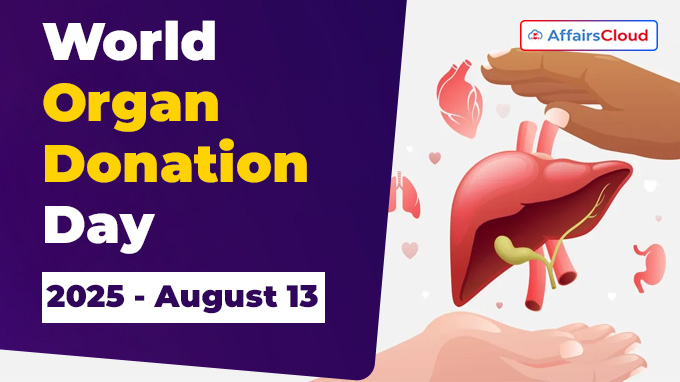 World Organ Donation Day is annually observed across the globe on August 13 to commemorate the first successful organ transplant in 1954.
World Organ Donation Day is annually observed across the globe on August 13 to commemorate the first successful organ transplant in 1954.
- The day is also observed to raise awareness about the importance of organ donation, encourage people to become organ donors, and promote organ donation to save lives.
Exam Hints:
- Event: World Organ Donation Day 2025
- When? August 13(annually)
- 2025 Theme: “Answering the Call”
- Commemoration: First Transplant in 1954 by American Surgeon Dr. Joseph E. Murray
- Nobel Prize: Awarded in 1990 in Physiology or Medicine to Joseph E. Murray and E. Donnall Thomas.
Theme:
2025 Theme: “Answering the Call”
Recognition: This theme, designated by the Organ Donation and Transplant Alliance, a non-profit organization (NPO), celebrates exceptional professionals committed to advancing organ donation and transplantation.
Background:
First Transplant: The world’s first successful living donor kidney transplant was performed in 1954 by American Surgeon Dr. Joseph E. Murray and his associates at Peter Bent Brigham Hospital (currently Brigham and Women’s Hospital) at Boston in Massachusetts, the United States of America (USA).
- The transplant took place between identical twins, Ronald and Richard Lee Herrick, with Ronald donating a key to Richard, who suffered chronic kidney failure.
Noble Prize: Joseph E. Murray and American physician E. Donnall Thomas were jointly awarded the Nobel Prize in Physiology or Medicine in 1990 for their discoveries concerning organ and cell transplantation in the treatment of human disease.
Types of Organ Donation:
Living Donation: A living person donates an organ or part of an organ that can function without harming his or her own health. It includes the donation of kidney, part of liver, lobe of lung, and part of pancreas.
Deceased donation: The organs are taken from a person who has been declared brain-dead or after circulatory death. From the brain-dead donors, organs such as heart, lungs, liver, kidneys, pancreas, and intestines can be retrieved.
- Certain organs and tissues such as cornea, skin, heart valves, can be donated from the person who suffered cardiac death.
Tissue donation: Tissues can be donated by both living and deceased donors. Tissues, including blood, bone marrow, and umbilical cord blood can be donated by living donors. Corneas, skin, heart valves, tendons, and bones can be donated from the deceased.
Impact:One registered donor can save up to 8 lives through solid organ donation and improve the lives of over 75 more by donating tissue and corneas. A single donor can donate multiple organs, such as the heart, lungs, liver, kidneys, pancreas, and small intestine.
Statistics: According to the United Network for Organ Sharing (UNOS), approximately 103,993 people need a life-saving organ transplant, but the limited number of donors creates a severe supply-demand gap.
Indian Organ Donation Day:
Observance: The Indian Organ Donation Day (IODD) is annually observed across India on August 3 of every year to commemorate the first successful deceased donor organ transplant, the first heart transplant in India.
- On August 3, 2025, 15th IODD was observed across India.
Organizer: It is observed by the National Organ and Tissue Transplant Organization (NOTTO), Ministry of Health and Family Welfare (MoHFW).




